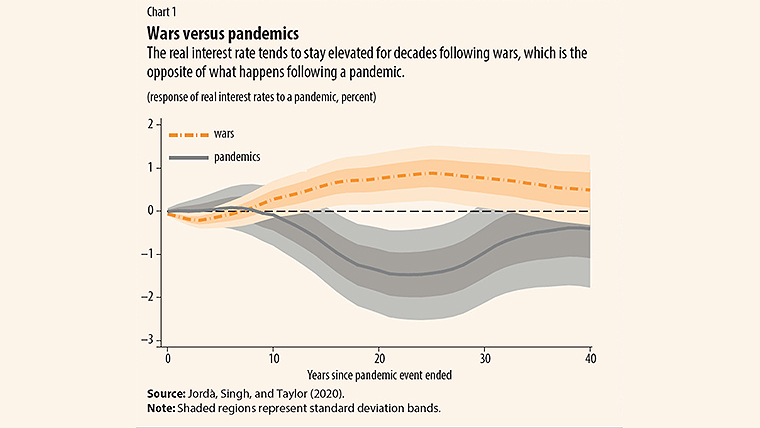
By Alison Brook*
COVID-19 is only the latest of many epidemics and pandemics to have afflicted the world throughout history. Each pandemic is unique in terms of the nature of the disease, the human response and its historical context. However, there is a lot to be learned from past pandemics, which can provide insights into how the economy may change as a result of COVID-19. So, what are some of the themes that have emerged after past pandemics?
Household savings increase
Household savings tend to increase during a pandemic as people deal with uncertainty by saving as much money as possible. According to an article in the Economist, Britain’s household savings rate doubled during a smallpox outbreak in the first half of the 1870s. Similarly, Americans saved more during the 1918 flu pandemic than in any subsequent year until WW2.
In 2020 household savings in many countries also spiked as the virus spread, boosted by direct government support which offset job losses. After a spending spree at the end of 2020, these savings rates have climbed again. Reuters reports that US household savings were higher in January of this year than any month in the 60 years before COVID-19. A similar savings pattern is also evident in the UK and Germany.
Interest rates decrease over the long term
A recent working paper published by the San Francisco Federal Reserve Bank looked at what happened to interest rates following 15 major pandemics from the past. They found that real natural interest rates remain depressed for two decades following a pandemic. Wars on the other hand tend to be inflationary and leave real rates higher for longer.

Whether the interest rates will stay low over the long term following COVID-19 is debatable. Unlike the current crisis, previous pandemics like the Black Death in 1348 decimated the labour force, leading to long-term labour shortages and increasing wages as a result. Plus, the government’s fiscal response this time around has been unprecedented in its scale.
Technology Boom
Previous pandemics have led to a surge in technological developments and innovation. One study showed an increase in patents filed after the 1918 flu pandemic. The flu pandemic is also credited with the spike of new business start-ups from 1919 and the advent of the automated telephone exchange in the 1920s.
The COVID-19 pandemic has seen increased digitisation across many industries. Severe social distancing restrictions accelerated the global shift to online shopping. Online sales rose to $26.7 trillion in 2020, making up 19 percent of all retail sales (up from 16 percent in 2019) according to an analysis by UNCTAD.
Organisations were forced to rethink their operations and bring forward long-term plans for technology transformation by as much as four years. Businesses have also used technology to improve their efficiency and resilience according to a Foreign Affairs survey of international business leaders in October 2020. Almost half of the respondents in that survey had reduced operating expenditures as a share of revenue, and two-thirds increased their investments in automation and artificial intelligence.
Political instability increases
Research from the IMF found that recent pandemics like SARS and Ebola tended to accelerate protests and other forms of civil unrest.
While pandemics are not necessarily the direct cause of instability, they tend to exacerbate existing social and political tensions.
This unrest is particularly likely in countries with high levels of income inequality and tends to peak about two years after the pandemic ends.
Can pandemics reduce inequality?
Walter Scheidel, the author of The Great Leveler argued that mass violence and catastrophes such as pandemics are the only forces throughout history that have decreased economic inequality.
However, this view has been disputed in a recent study by Bas van Bavel and Marten Scheffer who used empirical data to look at the effects of historical catastrophes on long-term wealth inequality. Whether COVID-19 will be the “great equalizer” depends on the distribution of wealth and political leverage within a society at the point of crisis. Pandemics tend to increase inequality where wealth and power are concentrated in the hands of a small elite and less so where it is more widely distributed amongst the ordinary people.
The data on whether COVID-19 has actually increased, or decreased inequality is mixed. The World Bank asserts that poverty levels and income inequality within and between countries have increased. However, a new analysis of worldwide COVID-19 data from Nobel Prize-winning economist Angus Deaton, suggests there is no evidence of increased inequality between nations. Rather, those countries with more COVID deaths saw larger declines in income. Because rich countries have seen more COVID deaths than poorer countries, per capita incomes fell by more in higher-income countries.
While some similar patterns emerged from past pandemics nothing at this stage is certain or inevitable. A lot will depend on how each country’s policymakers and business leaders respond over the long term after the immediate threat from COVID-19 passes. However, if past pandemics prove to be an accurate predictor of the current crisis, the economic impacts of COVID-19 could be with us for some time to come.
*Alison Brook is from the Knowledge Exchange Hub at the Massey University campus at Albany, Auckland. She is on the GDPLive team. This article is a post from the GDPLive blog, and is here with permission. The New Zealand GDPLive resource can also be accessed here.
14 Comments
Interesting article. Thanks
Given where we are on the growth/degrowth trajectory, it's a garbage-in / garbage out effort. Confuses driven and driver, more than once.
https://www.youtube.com/watch?v=qYeZwUVx5MY
Compare
"Because rich countries have seen more COVID deaths than poorer countries, per capita incomes fell by more in higher-income countries."
Are we talking nominally or proportionally? For the average kiwi a nominal few dollars a week is chicken feed but if you live in a less economically prosperous country it might mean the breadline.
isnt the covid plague an outlier?being selective and mainly fatal only to the elderly it differs from the black death ,that was indiscriminate and wiped out whole communities and the labour force ,while here it has mainly reduced those available for menial jobs and is less critical.
Eventually pandemics die out, and the disease becomes normalised. Flu, Cold, Malaria, Tetanus, Sars1, etc. And the world just learns to live with it. Just like learning to live with the risk of driving on the motorway, flying, travelling to countries with exotic diseases, overwork, etc.
What's your point?
We need a plan to move from closed borders and Lockdowns to Acceptance.
https://i.stuff.co.nz/national/politics/opinion/300354397/covid19-we-ne…
There are some diseases we refuse to tolerate, Leprosy, AIDS, Ebola to name a few, the world will have to decide if COVID and its offspring are tolerated or eliminated, that discussion hasn’t started yet.
DP
For sure, but it's all in the timing.
There are a number of difficult conversations ahead but unfortunately our leaders are effusive and evasive, never mind..
Dp
Dp
We need a plan to move from closed borders and Lockdowns to Acceptance.
https://i.stuff.co.nz/national/politics/opinion/300354397/covid19-we-ne…

We welcome your comments below. If you are not already registered, please register to comment
Remember we welcome robust, respectful and insightful debate. We don't welcome abusive or defamatory comments and will de-register those repeatedly making such comments. Our current comment policy is here.